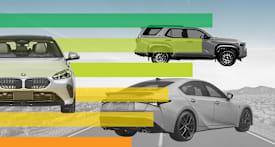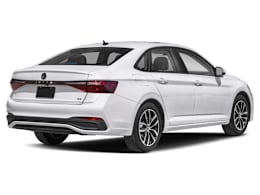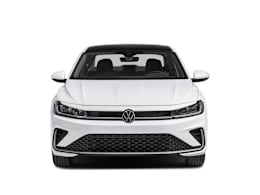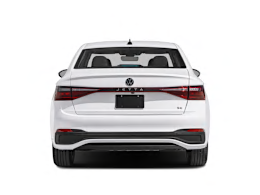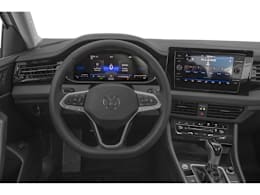The Jetta wins our praise for its impressive fuel economy, effortless acceleration, and mostly straightforward controls.
We got 34 mpg overall and 54 mpg on the highway in our tests with the 1.4-liter turbo (which has been replaced by a 1.5 turbo)—truly outstanding for a non-hybrid or non-diesel sedan of this size. Even with that superb fuel economy, the Jetta’s responsive turbo engine doesn't force the driver to press hard on the gas pedal for quick acceleration.
The eight-speed automatic transmission shifts smoothly, although it tends to upshift to higher gears in order to optimize fuel economy.
Handling is sound, but unlike the sporty handling of previous Jettas, the current model has notable body lean with steering that's not particularly sharp.
The ride is comfortable, and the suspension absorbs all but the sharpest bumps and road imperfections. This is a quiet car, particularly among compact sedans, and road and tire noise are well suppressed.
The Jetta is longer than its competitors, and this length is reflected in the roomy rear seat and huge trunk. Volkswagen made smart use of interior space, with big door pockets and a bin under the nicely padded armrest that can accommodate an iPad mini.
Our tested SE trim’s cabin has a premium ambience thanks to faux leather seats and automatic climate control. Every switch and button is easy to find and well-lit at night. Android Auto and Apple CarPlay compatibility is standard.
We like that the Jetta provides excellent visibility, and most drivers found the seating position to be comfortable. But there are some ergonomic issues: The low-mounted center vents direct too much air toward the driver’s elbow rather than to the body and face, and the wide center console rubs against the driver’s knee.
Forward collision warning, and automatic emergency braking with pedestrian detection, blind spot warning, rear cross traffic warning, lane keeping assistance, and lane departure warning are standard. Adaptive cruise control and lane centering assistance are also standard.

